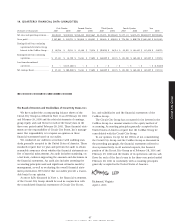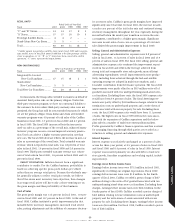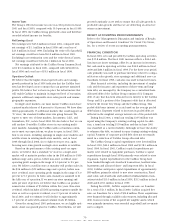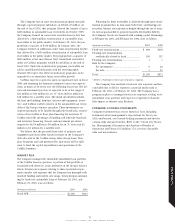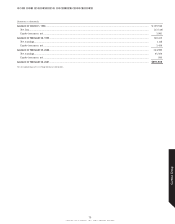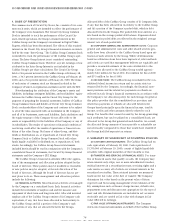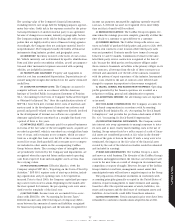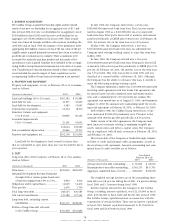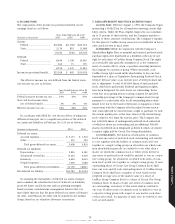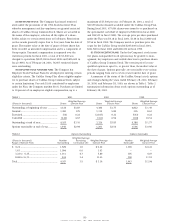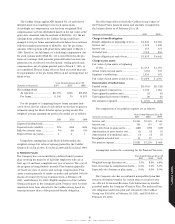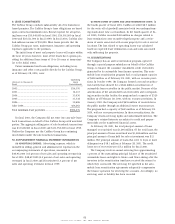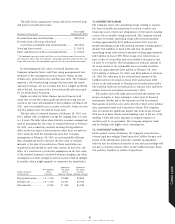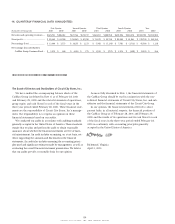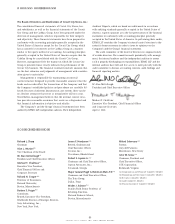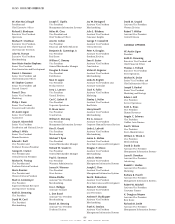CarMax 2001 Annual Report Download - page 79
Download and view the complete annual report
Please find page 79 of the 2001 CarMax annual report below. You can navigate through the pages in the report by either clicking on the pages listed below, or by using the keyword search tool below to find specific information within the annual report.
Notes to CarMax Group Financial Statements
1. BASIS OF PRESENTATION
The common stock of Circuit City Stores, Inc. consists of two com-
mon stock series, which are intended to reflect the performance of
the Company's two businesses. The Circuit City Group Common
Stock is intended to track the performance of the Circuit City
store-related operations, the Group’s retained interest in the
CarMax Group and the Company’s investment in Digital Video
Express, which has been discontinued. The effects of this retained
interest on the Circuit City Group’s financial statements are identi-
fied by the term “Inter-Group.” The CarMax Group Common Stock
is intended to track the performance of the CarMax Group's oper-
ations. The Inter-Group Interest is not considered outstanding
CarMax Group Common Stock. Therefore, any net earnings or loss
attributed to the Inter-Group Interest is not included in the
CarMax Group’s per share calculations. The Circuit City Group
held a 74.6 percent interest in the CarMax Group at February 28,
2001, a 74.7 percent interest in the CarMax Group at February 29,
2000, and a 76.6 percent interest at February 28, 1999. The terms
of each series of common stock are discussed in detail in the
Company's Form 8-A registration statement on file with the SEC.
Notwithstanding the attribution of the Company’s assets and
liabilities, including contingent liabilities, and stockholders’ equity
between the CarMax Group and the Circuit City Group for the
purposes of preparing the financial statements, holders of CarMax
Group Common Stock and holders of Circuit City Group Common
Stock are shareholders of the Company and continue to be subject
to all of the risks associated with an investment in the Company
and all of its businesses, assets and liabilities. Such attribution and
the equity structure of the Company do not affect title to the
assets or responsibility for the liabilities of the Company or any of
its subsidiaries. The results of operations or financial condition of
one Group could affect the results of operations or financial con-
dition of the other Group. Net losses of either Group, and divi-
dends or distributions on, or repurchases of, Circuit City Group
Common Stock or CarMax Group Common Stock will reduce
funds legally available for dividends on, or repurchases of, both
stocks. Accordingly, the CarMax Group financial statements
included herein should be read in conjunction with the Company’s
consolidated financial statements, the Circuit City Group financial
statements and the Company's SEC filings.
The CarMax Group’s financial statements reflect the applica-
tion of the management and allocation policies adopted by the
board of directors. These policies may be modified or rescinded,
or new policies may be adopted, at the sole discretion of the
board of directors, although the board of directors has no pre-
sent plans to do so. These management and allocation policies
include the following:
(A) FINANCIAL ACTIVITIES: Most financial activities are managed
by the Company on a centralized basis. Such financial activities
include the investment of surplus cash and the issuance and
repayment of short-term and long-term debt. Allocated invested
surplus cash of the CarMax Group consists of (i) Company cash
equivalents, if any, that have been allocated in their entirety to
the CarMax Group and (ii) a portion of the Company’s cash
equivalents, if any, that are allocated between the Groups.
Allocated debt of the CarMax Group consists of (i) Company debt,
if any, that has been allocated in its entirety to the CarMax Group
and (ii) a portion of the Company’s pooled debt, which is debt
allocated between the Groups. The pooled debt bears interest at a
rate based on the average pooled debt balance. Expenses related
to increases in pooled debt are reflected in the weighted average
interest rate of such pooled debt.
(B) CORPORATE GENERAL AND ADMINISTRATIVE COSTS: Corporate
general and administrative costs and other shared services gen-
erally have been allocated to the CarMax Group based upon uti-
lization of such services by the Group. Where determinations
based on utilization alone have been impractical, other methods
and criteria are used that management believes are equitable and
provide a reasonable estimate of the costs attributable to the
Group. Costs allocated to the CarMax Group totaled approxi-
mately $4.0 million for fiscal 2001, $5.6 million for fiscal 2000
and $7.5 million for fiscal 1999.
(C) INCOME TAXES: The CarMax Group is included in the con-
solidated federal income tax return and in certain state tax
returns filed by the Company. Accordingly, the financial state-
ment provision and the related tax payments or refunds are
reflected in each Group’s financial statements in accordance with
the Company’s tax allocation policy for such Groups. In general,
this policy provides that the consolidated tax provision and
related tax payments or refunds are allocated between the
Groups based principally upon the financial income, taxable
income, credits and other amounts directly related to each
Group. Tax benefits that cannot be used by the Group generating
such attributes, but can be utilized on a consolidated basis, are
allocated to the Group that generated such benefits. As a result,
the allocated Group amounts of taxes payable or refundable are
not necessarily comparable to those that would have resulted if
the Groups had filed separate tax returns.
2. SUMMARY OF SIGNIFICANT ACCOUNTING POLICIES
(A) CASH AND CASH EQUIVALENTS: The CarMax Group had no
cash equivalents at February 28, 2001. Cash equivalents of
$1,770,000 at February 29, 2000, consist of highly liquid debt
securities with original maturities of three months or less.
(B) TRANSFERS AND SERVICING OF FINANCIAL ASSETS: For trans-
fers of financial assets that qualify as sales, the Company may
retain interest-only strips, one or more subordinated tranches,
residual interests in a securitization trust, servicing rights and a
cash reserve account, all of which are retained interests in the
securitized receivables. These retained interests are measured
based on the fair value at the date of transfer. The Company
determines fair value based on the present value of future
expected cash flows using management’s best estimates of the
key assumptions such as finance charge income, default rates,
prepayment rates and discount rates appropriate for the type of
asset and risk. Retained interests are included in net accounts
receivable and are carried at fair value with changes in fair
value reflected in earnings.
(C) FAIR VALUE OF FINANCIAL INSTRUMENTS: The Company
enters into financial instruments on behalf of the CarMax Group.
76
CIRCUIT CITY STORES, INC. 2001 ANNUAL REPORT



